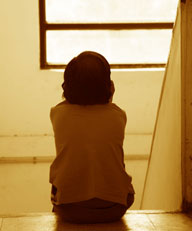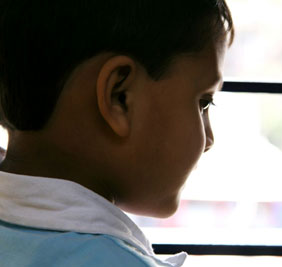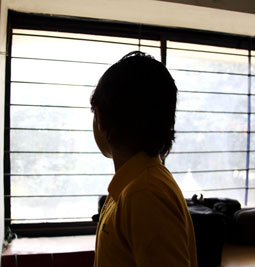| |
| |
| |
 |
| |
| |
| Autism Spectrum Disorder: |
| |
|
Autism Spectrum Disorder (ASD) is a developmental disability considered to be the result of a neurological condition affecting normal brain function, development and social interaction.
It is a lifelong disability and the symptoms are typically seen before the age of 3 years.
Children with ASD show 3 basic impairments:- |
|
|
|
Social Interaction
They -
Indifference to others, although some enjoy certain forms of
active physical contact.
Passive acceptance of social contact with some signs of
pleasure but rarely spontaneous.
Occasional approach towards others but in an odd, inappropriate,
repetitive way, paying little or no attention to the other person’s
response.
|
|

|
|
| |
|
Social Communication
They -Non appreciation of social purpose and pleasure of communication even when verbal, talking ‘at’ others and
not ‘to’ them
Non-comprehension of language as a tool for communication. With practice asking for own needs is possible but
difficulty in expressing feelings or thoughts. Lack of standing emotions, ideas and beliefs of others.
|
| |
|
Imagination
They -
Inability to play imaginatively with toys, with others.
Tendency to focus on minor trivial things. For example earrings, rather than the person wearing it, or a wheel instead of the whole toy train.
Missing out on social conversation and literature and subtle humour
|
|
 |
|
| |
|
Repetitive Behavior
Along with the above impairments, they usually show repetitive behavior. At a simple level, this might involve repeatedly flicking their fingers or an object like a piece of string. More complex signs may include an insistence on following an identical route to certain places, a lengthy bedtime ritual or the repetition of a sequence of odd, bodily movements.
They may also form an intense attachment to particular objects for no apparent reason, arrange objects in lines or patterns, collect things like pebbles or plastic bottles without apparent regard to their intended purpose. They may become fascinated by certain topics, such as electricity, astronomy, birds or train timetables; or even specific people; asking the same series of questions and demanding standard answers. While some of these patterns of behaviour are recognisable features of normal development, it is the intensity and frequency, combined with a disregard for the normal purpose of activities, that suggest a pervasive developmental disorder. |
| |
|
Challenging Behavior
They may also demonstrate challenging behavior such as running away, screaming, biting or kicking other people, grabbing things off counters in shops, socially unacceptable habits or making naive and embarrassing remarks.
Special Skills
About 10% of children with Autism Spectrum Disorders have some special skill at a much higher level than the rest of their abilities; like music, art, numerical calculations or jigsaw puzzles. Some have a remarkable memory for dates and things that particularly interest them.
Causes
Presently there is no known cause for Autism. However most experts say that autism is probably caused by a combination of genetic and environmental factors.
|
|
 |
Intervention
Children with Autism can make significant progress if the intervention is appropriate and consistent. Early intervention, before the age of 5, is especially crucial to progress. This is why an early and accurate diagnosis is important. |
| |
|
|
|
| |
|
|
|
 |
|
|
|
|
|
 |
|
|
|
|